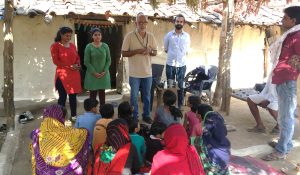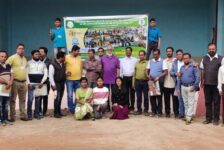Part 3: The Apprentice
AAI’s work in Uganda and their billboard campaign in Guatemala, inspired me to think about how critical thinking skills could be promoted in my home country, India. These campaigns seemed brilliant to me because they happened in places where atheists could not even imagine having a voice before.
For the past three years, I had attended the World Atheist Conference on the behalf of AAI and had met several local NGOs and individuals doing concrete work in the field of promoting critical thinking skills. Thus, I formulated a proposal that AAI should fund a critical thinking project in India.
I have seen the rise of falsified data, completely irrational concepts preached as factual truths, glorification of religious texts and miracles touted as historical facts. These regressive and damaging practices have become mainstream in India in just the past few years. Such narratives are presented as facts by political figures in India, who openly support and promote the godmen who use these beliefs to extort money from people. Currently, there are no mainstream organizations speaking out against this, it is left to small scale NGOs and individual activists, such as Professor Narendra Nayak.
Narendra Nayak has been a personal inspiration for me. He does critical thinking projects in a style that the West may relate to James Randi—but in the streets, colleges, schools, and in some of the most remote villages in rural India. The presentations fascinated me; the visible curiosity in children’s faces in the photos and videos of Nayaks presentations was amazing. I knew this was something I could take a lead on in the years to come. Delighted with the prospect, Nayak suggested I join him on his next project so I could understand how these projects work.
Working with Narendra Nayak was a truly humbling experience. My false belief that the work consisted of seamless presentations with everything organized was completely proven wrong. No amount of preparation could predict the dynamic nature of the work done on ground. The areas selected were so remote, even transportation in a car was a luxurious privilege that was hard to find. And there was a very tangible threat from local religious sects, leaders and even parents if they had even a hint that their kids were being taught atheism.
The heat at 47 degrees C was beyond comprehension. Yet, Narendra Nayak demonstrated the utmost zeal for his work. His passion for teaching was evident. His humble outlook on life meant he volunteered to adopt the cheapest form of public transportation, food and accommodation despite his age, thus minimizing our expenses.

Narendra and Rustam as the audience arrives
However, I was surprised by the way we were unanimously accepted in the villages. I thought without threats, or the lure of an incentive, no student would sit still and watch our presentation without mocking us. That surprisingly, did not happen at all. Deprived of hands on, visual science and a theatrical, comic style of presentation in their otherwise regular schooling schedule, the audiences of all ages displayed a lot more patience than I remembered having myself at the same age.
I am a quick learner, and the skill set required to learn the tricks would not be difficult for anyone to learn. However, the patience and resilience required to deal with such an exhausting schedule of presentations is something that I need to work on.
The whole week-long experience helped me realize my own privilege—the luxuries I take for granted as a middle-class millennial in India. There are many reasons for my own critical thinking abilities, including my privilege to go a top-notch school, and specialized further education. The vast majority of Indians would never even know of the existence of logical reasoning, the scientific method or rational explanations for the ‘miracles’ they are exposed to. They become easy targets for exploitation by local godmen, cults, nationalistic organizations, and hateful xenophobic propaganda.
Having the honor to help even one child to ask questions, to speak out against social norms, to identify miracles and seek a rational explanation for them, inspires me to rise to the challenge to keep this work going. This task requires more manpower, more resources, and more time for replication on a larger scale. Despite being objectively out of my comfort zone, the eager, happy faces and the natural curiosity the children displayed was extremely rewarding.
Rustam Singh









